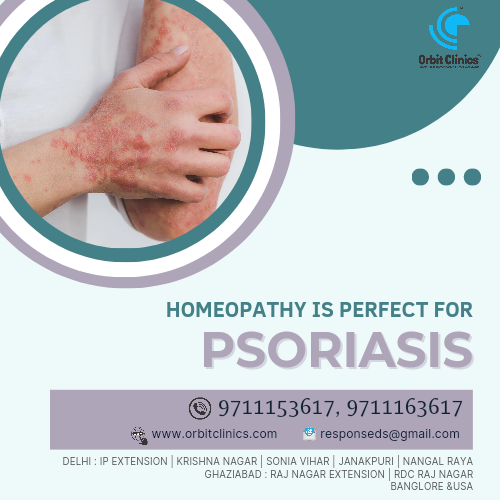a comprehensive exploration and homeopathic treatment

Written by
Dr. Deepak Sharma
BHMS, MD, Ph.D. (Scholar)
Homeopathic Physician and Educator
Founder – Orbit Clinics
Introduction:
Psoriasis is a chronic, non-contagious autoimmune skin disorder that affects millions of people worldwide. It is characterized by the rapid growth of skin cells, which leads to the formation of red, scaly patches on the skin’s surface. Despite being a common condition, psoriasis is still widely misunderstood, with many people unaware of its underlying causes, risk factors, and pathogenesis. This article aims to shed light on these aspects and provide an overview of the key signs and symptoms of psoriasis.
Definition:
Psoriasis is a chronic inflammatory skin disorder that results from an overactive immune system. The condition primarily affects the skin, but it can also involve the nails and joints. Psoriasis is characterized by the formation of red, raised plaques with silvery-white scales, which can be itchy and painful. The severity of psoriasis varies from person to person, with some individuals experiencing mild symptoms while others suffer from more extensive and debilitating manifestations.
Causes and Risk Factors:
The exact cause of psoriasis remains unknown, but it is believed to result from a complex interplay of genetic and environmental factors. Several risk factors have been identified, including:
- Genetics: Psoriasis has a strong genetic component, with a higher risk observed in individuals who have a family history of the condition. Specific genes associated with psoriasis have been identified, but their precise role in the development of the disease is still being investigated.
- Immune system: Psoriasis is an autoimmune disorder, meaning that the immune system mistakenly attacks healthy skin cells. This results in an overproduction of skin cells, which accumulate and form the characteristic plaques.
- Environmental triggers: Certain factors can trigger or worsen psoriasis symptoms, such as infections, skin injuries, stress, smoking, and excessive alcohol consumption.
Pathogenesis:
The pathogenesis of psoriasis involves both the immune system and the skin. In people with psoriasis, the immune system produces an excess of cytokines, which are signaling proteins that regulate inflammation. These cytokines, particularly tumor necrosis factor-alpha (TNF-alpha) and interleukin-17 (IL-17), promote the rapid growth and abnormal differentiation of skin cells, leading to the formation of psoriatic plaques.
Signs and Symptoms:
The signs and symptoms of psoriasis can vary depending on the type and severity of the condition. Common manifestations include:
- Plaques: Red, raised, inflamed patches of skin covered with silvery-white scales. These plaques can appear anywhere on the body but are most commonly found on the elbows, knees, scalp, and lower back.
- Itching and discomfort: Psoriatic plaques can be itchy, painful, and prone to cracking and bleeding, which can cause significant discomfort.
- Nail changes: Psoriasis can cause pitting, discoloration, and thickening of the nails, as well as separation of the nail from the nail bed.
- Joint pain: In some cases, psoriasis can lead to psoriatic arthritis, a painful and potentially debilitating condition that affects the joints.
Types of Psoriasis:
This article will guide you through the different types of psoriasis, enhancing your understanding of this multifaceted disorder.
- Plaque Psoriasis (Psoriasis Vulgaris)
The most prevalent form of psoriasis, accounting for around 80-90% of cases, is plaque psoriasis. This type manifests as raised, reddish, and scaly patches on the skin’s surface, often accompanied by itching or burning sensations. Plaque psoriasis commonly affects the elbows, knees, lower back, and scalp, but can appear anywhere on the body.
- Guttate Psoriasis
Representing approximately 2% of psoriasis cases, guttate psoriasis is characterized by small, drop-shaped lesions scattered across the skin. It typically affects the trunk, arms, and legs, and is more common in children and young adults. Often triggered by a streptococcal infection, guttate psoriasis can resolve on its own or progress to plaque psoriasis in some cases.
- Inverse Psoriasis (Intertriginous Psoriasis)
Inverse psoriasis affects the body’s skin folds, such as the groin, armpits, and beneath the breasts. Its presentation differs from other types, as it appears as smooth, shiny, and red patches without characteristic scaling. The affected areas are prone to irritation due to friction and moisture, making treatment challenging.
- Pustular Psoriasis
A rare and severe form of psoriasis, pustular psoriasis is characterized by the presence of pus-filled blisters (pustules) on the skin. These blisters are not infectious, as the pus consists of white blood cells. Pustular psoriasis can be localized, affecting specific areas like the hands and feet (palmoplantar pustulosis), or generalized, involving larger areas of the body. Generalized pustular psoriasis can be life-threatening and requires immediate medical attention.
- Erythrodermic Psoriasis
Erythrodermic psoriasis is the rarest and most severe type, affecting less than 3% of psoriasis patients. It presents as widespread redness and severe scaling, covering most of the body’s surface. Erythrodermic psoriasis can lead to dangerous complications, such as dehydration, infection, and heart failure. Immediate medical intervention is necessary for patients experiencing this type of psoriasis.
- Nail Psoriasis
While not a separate type, nail psoriasis deserves mention, as it affects up to 50% of psoriasis patients. It can manifest as pitting, thickening, discoloration, or even separation of the nail from the nail bed. Nail psoriasis can be particularly distressing due to its impact on daily activities and self-esteem.
- Psoriatic Arthritis
Psoriatic arthritis is a type of inflammatory arthritis that occurs in up to 30% of psoriasis patients. It causes joint pain, stiffness, and swelling, often accompanied by skin manifestations. Early diagnosis and treatment are crucial to prevent joint damage and maintaining mobility.
The Psoriasis-Diet Connection:
The immune system and inflammation play a crucial role in the development of psoriasis. An unbalanced diet, rich in processed foods and low in essential nutrients, can contribute to inflammation and exacerbate psoriasis symptoms. Consequently, adopting a well-balanced diet may help alleviate inflammation and improve skin health.
- Anti-inflammatory foods: Foods rich in omega-3 fatty acids, such as fish (salmon, mackerel, and sardines), flaxseeds, and walnuts, possess anti-inflammatory properties that may help reduce psoriasis-related inflammation. Additionally, fruits and vegetables high in antioxidants, such as berries, leafy greens, and colorful produce, can help combat oxidative stress and inflammation.
- Gluten-free diet: For some individuals with psoriasis, a gluten-free diet may prove beneficial. Research suggests that those with psoriasis may be more prone to gluten sensitivity, and a gluten-free diet can lead to a reduction in symptoms. Consult with a healthcare professional before making this dietary change.
- Weight management: Obesity is a risk factor for psoriasis, and research has shown that losing weight can lead to a significant improvement in symptoms. Adopting a calorie-controlled, nutrient-dense diet can aid in weight loss and ultimately improve psoriasis outcomes.
Exercising with Psoriasis: Benefits and Strategies:
Regular exercise is essential for overall health and well-being, and it plays a crucial role in managing psoriasis. Exercise can help reduce inflammation, improve mental health, and support weight management.
- Cardiovascular exercise: Engaging in regular aerobic exercise can help reduce inflammation and promote better circulation, which is essential for healthy skin. Aim for at least 150 minutes of moderate-intensity aerobic exercise, such as brisk walking, swimming, or cycling, per week.
- Strength training: Incorporating strength training exercises into your routine can help build lean muscle mass and support weight management. Focus on bodyweight exercises or resistance training with weights two to three times per week.
- Flexibility and stress reduction: Stress can trigger psoriasis flare-ups. Activities such as yoga, tai chi, and meditation can help improve flexibility and reduce stress, ultimately benefiting those with psoriasis.
- Skin care during exercise: To prevent irritation or injury to psoriasis-affected areas, wear loose-fitting, moisture-wicking clothing, and use a gentle, fragrance-free moisturizer before and after exercise. If you have psoriatic arthritis, consult with a healthcare professional to tailor an exercise program that addresses your unique needs.
Complications:
I. Physical Complications
- Psoriatic Arthritis
Approximately 30% of individuals with psoriasis develop psoriatic arthritis, an inflammatory form of arthritis that leads to joint pain, stiffness, and swelling. If left untreated, this condition can cause irreversible joint damage and disability. Early diagnosis and intervention are crucial to mitigate the progression of psoriatic arthritis.
- Cardiovascular Disease
Research indicates that individuals with psoriasis have an increased risk of cardiovascular disease, including heart attacks and strokes. The systemic inflammation associated with psoriasis is believed to contribute to the development of atherosclerosis, a condition wherein plaque buildup narrows the arteries.
- Metabolic Syndrome
Individuals with psoriasis are more likely to experience metabolic syndrome, a cluster of conditions that include obesity, high blood pressure, high blood sugar, and abnormal cholesterol levels. These factors heighten the risk of heart disease, stroke, and type 2 diabetes.
- Eye Disorders
Psoriasis can also manifest in the form of eye disorders, such as uveitis, which causes inflammation in the middle layer of the eye. Uveitis can lead to eye pain, redness, sensitivity to light, and blurred vision, and may eventually result in vision loss if left untreated.
- Infections
Psoriasis patients are more susceptible to infections due to weakened immune systems and the use of immunosuppressive medications. Skin infections, such as cellulitis, are more common in people with psoriasis and can exacerbate the severity of the condition.
II. Psychological Complications
- Depression and Anxiety
The chronic and visible nature of psoriasis can lead to feelings of embarrassment, self-consciousness, and social isolation. As a result, individuals with psoriasis are more likely to experience depression and anxiety. It is essential to address these psychological complications alongside the physical symptoms to improve overall well-being.
- Impaired Quality of Life
Psoriasis can significantly impact an individual’s quality of life. The constant itchiness and discomfort can disrupt sleep and daily activities, while the appearance of lesions can limit social interactions and affect self-esteem. A comprehensive approach to treatment should include strategies to manage both the physical and emotional aspects of the condition.
Homeopathic Treatment:
Homeopathy, a holistic form of medicine, has been used for over two centuries to treat various ailments. The principle of “like cures like” is the basis of homeopathy, where a substance that causes symptoms in a healthy person can be used to treat similar symptoms in an affected individual.
- Arsenicum Album
Arsenicum Album, a potent remedy for psoriasis, addresses dry, scaly skin, intense itching, and burning sensations. Derived from arsenic, this remedy targets the anxiety and restlessness often associated with the condition.
- Graphites
Graphites, derived from graphite, is an excellent remedy for treating thick, cracked skin and oozing eruptions. It is particularly helpful for individuals experiencing eczema-like symptoms in conjunction with their psoriasis.
- Sulphur
Sulphur, a common element, is highly effective in treating various skin conditions, including psoriasis. It addresses dry, scaly, and itchy skin, as well as burning sensations and redness.
- Calcarea Carbonica
Calcarea Carbonica, derived from oyster shells, is ideal for individuals with cold, clammy skin and a tendency to develop psoriasis in damp, cold environments. It also helps alleviate the itching and burning sensations associated with the condition.
- Rhus Toxicodendron
Rhus Toxicodendron, sourced from poison ivy, is beneficial for individuals with painful, swollen, and inflamed skin. This remedy is particularly helpful for those who experience relief from warm applications or hot baths.
- Lycopodium
Lycopodium, derived from club moss, is an effective remedy for treating psoriasis that worsens with the application of heat or warm water. It is particularly helpful for individuals with dry, scaly skin and deep fissures.
- Mezereum
Mezereum, sourced from the spurge olive plant, effectively treats psoriasis with thick, crusty eruptions and severe itching. It is particularly beneficial for those experiencing symptoms on the scalp and face.
- Sepia
Sepia, derived from cuttlefish ink, is a powerful remedy for individuals experiencing hormonal imbalances and worsening psoriasis symptoms during hormonal fluctuations.
- Natrum Muriaticum
Natrum Muriaticum, sourced from common salt, is an effective treatment for individuals who have dry, scaly skin and a burning sensation after scratching. It is particularly helpful for those who experience symptoms in the folds of the skin.
- Petroleum
Petroleum, derived from crude oil, is beneficial for individuals experiencing thick, cracked skin and oozing eruptions. It is especially helpful for those with symptoms that worsen in cold weather or after exposure to water.
- Psorinum
Psorinum, a nosode prepared from psoriasis tissue, is a powerful remedy for treating severe, persistent cases of the condition. It can help address intense itching, burning, and eruptions that worsen in the winter.
- Kali Arsenicosum
Kali Arsenicosum, a combination of potassium and arsenic, is useful for treating psoriasis with patches of dry, scaly skin that are prone to cracking and bleeding.
- Kali Bromatum
Kali Bromatum, derived from potassium bromide, is effective for treating psoriasis accompanied by acne-like eruptions and red, inflamed skin.



